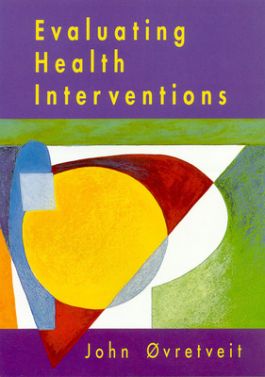Evaluating Health Interventions
- Access the eBook anytime, anywhere: online or offline
- Create notes, flashcards and make annotations while you study
- Full searchable content: quickly find the answers you are looking for
Evaluation purpose, theory and perspectives
Six designs
Seven case examples of evaluations
Experimental evaluations
Economic evaluations
Developmental evaluations
Managerial evaluations
Planning and managing an evaluation
The practice and politics of evaluation
Data gathering methods
Data gathering concepts, analysis and interpretation
Evaluating quality
Making more use of evaluations
References
Appendix 1
Definitions
Appendix 2: Framework for analysing an evaluation
Appendix 3: Six evaluation designs - 'empty' formats
Appendix 4: Ten learning exercises
Index
'As both volume and skills in healthcare increase, there is a parallel increase in the need to evaluate the outcomes and the effects of services rendered. In this book John Ovretveit furnishes us with timely, thoughtful and thorough guidelines for evaluation methods applied to health services.'
- Gudmund Hernes, Minister of Health, Norway.
A basic textbook which describes the range of approaches to evaluation in healthcare and policymaking, and challenges some of the assumptions of the evidence based healthcare movement. For health practitioners, managers and policy advisers who need to use or carry out an evaluation, but who may be confused by the variety of approaches and about what we mean by 'evidence'. The book is also useful to researchers who need to know about the strengths and weaknesses of different types of evaluation and about the practice and politics of evaluation. It describes principles, concepts and methods for evaluating health treatments, services, policies and organizational interventions.
The strength of this book is its even-handed and accessible overview of the many different evaluation perspectives and methods used in the health sector. Its practical and multidisciplinary approach shows how to ensure that evaluation results in action. The author draws on his eighteen years experience as an evaluator and gives frameworks and examples which have been tried and tested in workshops, teaching and distance learning materials which explain the complexities of evaluation. The reader will find this an invaluable introduction and reference book for understanding the increasingly important role which evaluation is playing in everyday clinical, managerial and policymaking work.
Winner of the 1998 European Health Management Association distinguished publication award.

